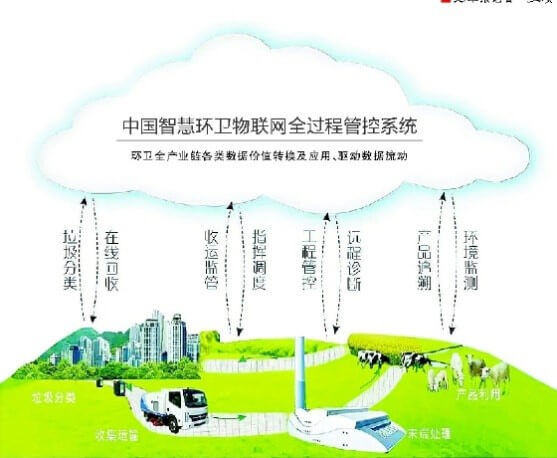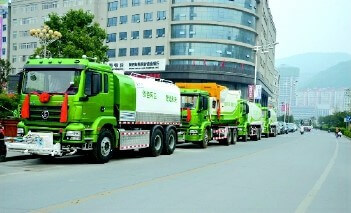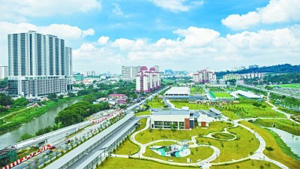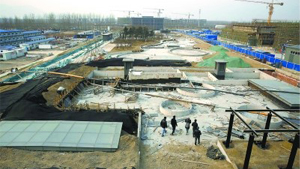The People’s Political Consultative Daily | Environment Sanitation is Moving Towards “Intelligent Development” 2016-11-10

Integrated environment and sanitation project of Xunyang County, Shaanxi Province

From “pushing a trolley with a broom and a shovel” in the past to road sweepers, garbage trucks and other mechanized equipment, sanitation work has not yet been separated from the impression of “dirty, chaotic, miscellaneous and low degree of science and technology”. “Crowd, large coverage and disorder” are the most distinguishing characteristics of sanitation management.
The environmental sanitation department has been concerned about how to configure and optimize the combination of a large number of sanitation resources. In particular, as the city size is growing and the production of waste is increasing day by day, people have increasing demand for the surrounding environment, and it is conceivable that the challenges of sanitation management will also increase.
A research report shows that in China, in the whole process management of municipal waste from production to disposal, the collection and transportation costs account for about 60% -80% of the total cost. This shows that with scientific management, the optimized collection and transportation system will be of great importance to the environmental sanitation industry and the whole society.
However, the survey shows that China’s waste management attach great importance to the terminal garbage disposal device (such as landfill and waste incineration). The research on garbage collection and transportation system is lagging behind. Problems such as blind selection of front-end collection containers and garbage transfer station locations, unmatched construction scale, waste of human and material resources, and difficulty in management and assessment are obvious.
In this context, how to optimize environmental sanitation management is a problem to be solved. At the first China Intelligent Environmental Sanitation Summit Forum held recently, experts and related businesses believe that the answer can be found in “intelligent sanitation”.
Intelligent sanitation is not only monitoring
What is “intelligent sanitation”? Cui Jian, Vice President of Beijing Enterprises Water Group Limited ("BEWG") and Chairman of Beijing Enterprises Environment Investment (China) Limited, presented the concept of “intelligent management on people, objects, events using mobile Internet, Internet of things, big data, cloud computing and other technical and information means to realize meticulous, scientific and standardized operation management.
It sounds very abstract, but it will be simple using an example.
In Xinji City, Hebei Province, the sanitation work involves 13 municipal main roads, a region covering an area of nearly 5.97 million square meters, the management of 3 household garbage transfer stations, 23 public toilets, 3950 garbage bins, 107 mechanical equipment for waste transportation and transfer, mechanized cleaning, watering and electric vehicle operations, and 820 sanitation workers. The management of workforce, finance and articles undoubtedly tests the ability and wisdom of managers.
In recent years, Xinji City has gradually introduced the intelligent sanitation system. All vehicles are installed with GPS monitoring and vehicle-mounted video surveillance system to conduct real-time monitoring on garbage collection, vehicle travelling routes, speed, transportation amount, workload, and fuel consumption; vehicle travelling routes are constantly optimized to reduce operating costs by analyzing data; operation and security of key parts are monitored timely to timely find out hidden dangers through real-time images; for sanitation workers, the system is equipped with digital camera to know workers’ dynamic situation with a distress function, and the company can make timely rescue in case of danger; the system can immediately collect, transfer, deal with problems reflected by the masses by setting up an interactive platform.
The basic structure of “intelligent sanitation” has initially come into shape with remarkable results.
However, in the view of industry participants, this is only the initial application of intelligent sanitation.
Cui Jian pointed out that a sophisticated intelligent sanitation system in the future should not only include the optimal allocation of sanitation resources, safe operation of sanitation facilities; but also play a more active role in urban and rural sanitation development planning, and decision-making support. For example, it can provide emergency response programs under inclement weather (such as typhoons, storms, blizzard, freezing, etc.) and basic data and aid decision support in response to major events, emergencies, etc., in conjunction with weather forecasts.
Even in the garbage sorting work that is progressing slowly, the intelligent sanitation system can make a difference.
“By using the intelligent sanitation, the refuse production and composition can be analyzed and forecasted with technical means in the future, which will not only optimize the garbage collection and transportation logistics, the layout of sanitation facilities, but also establish an evaluation mechanism for the source of garbage. Residents or buildings doing well in garbage classification will be rewarded, deducting the property costs or exchange some small gifts”, Zhang Linhai, Director of BEWG and vice general manager of Beijing Enterprises Environment Investment (China) Limited said, “Technology is already mature, the main problem is cost-recovering, but this is the direction of development. What we have to do is to set up a platform and system, to collect, analyze and debug the data, and to ultimately incorporate the data into the comprehensive utilization of intelligent city data.”
100 billion market to attract many enterprises to “ride on a horse to enclose”
In fact, for many enterprises, the intelligent sanitation is favored because it is necessary for enterprises to optimize management, and reduce the cost, and it is a result of increasingly strict supervision and fierce market competition.
According to Zhang Pingwen, Academician of the Chinese Academy of Sciences, and director of the Academic Committee of the Beijing Large Data Research Institute, the sanitation industry in China has gone through three stages of development: before 2000, it was led by government and implemented by sanitation institutions with small market scale; from 2000 to 2010, it entered the small-scale market stage. Some regions introduced social capital into the sanitation industry by tenders; after 2010, with the public service market reform, Shanghai, Fujian, Beijing, Tianjin, Jiangxi, and more and more provinces and cities have introduced policies of getting sanitation operations to the market, and a large number of sanitation market projects were launched.
Against this background, many companies were “onboard”
Data show that China’s market size of urban road cleaning, garbage clearance, and public toilets management reached 125 billion yuan in 2015. By 2020, the total size of the sanitation industry (including sanitation equipment, sanitation services and garbage disposal) is expected to exceed 200 billion yuan, and the market rate will increase from 15% to more than 50%.
“It will be crucial for the sanitation industry to “seize market opportunities” over the next three to five years.” This has become the industry’s general consensus, and using “intelligent sanitation” development becomes the best choice for many enterprises.
It was learned that Beijing Environmental Protection Engineering Group, Fujian Longma Sanitation, Tus-Sound and other enterprises have signed a number of sanitation services at the beginning of 2015. Some companies that have not been involved in sanitation industry in the past have also seen the market outlook of the sanitation industry.
In July 2015, the BEWG, which occupies a large market share in the sewage treatment market, set up Beijing Enterprises Environment Investment (China) Limited, which provides solid waste and sanitation services relying on its brand strength and management experience in urban operations and public utilities. It is reported that, so far, it has signed the integrated sanitation service agreement with more than 20 domestic cities (districts and counties) with a total contract amount of billions of dollars.
Calling on sharing and development
Although the industry is full of expectations and visions for the intelligent sanitation, experts also know that this is not an overnight process.
At the meeting, a representative of Suzhou Environmental Sanitation Department shared the experience of sanitation information construction in Suzhou, “Information technology has been built for 8 years since 2008, and 19 information systems were completed with a total investment of 26.57 million yuan, including sanitation management system, vehicle-mounted GPS terminal and video projects for transfer stations, and construction waste intelligent monitoring platform software projects.”
While the participants expressed admiration for the achievements and experiences of Suzhou, the reporter also admitted that “it also needs to think calmly, because the earnings of sanitation industry for 8 years is far from expected. We share data accumulated for many years for the purpose of providing reference information as a ‘water tester’ to the latecomers for the common development of sanitation information technology.”
The speech arouse deep thoughts of experts and scholars --- is the imbalance between input and output due to the lack of scientific system planning, which led to serious fragmentation of functions? Or did not fully exploiting data cause information superficial? Or does the repetitive function of multiple systems result in excessive construction costs?
“General speaking, the information isolated island is very serious.” Cao Man, director of China Association of Urban Environmental Sanitation Division of Smart Environmental Sanitation, pointed out the primary problem faced by intelligent sanitation. “Information exchange and sharing exist within the enterprise, among enterprises and across enterprises. Enterprises, groups and local governments have entered the dead end of information technology, and data ownership has become the bottleneck of Internet and data sharing.”
Cao Man claims that the intelligent sanitation must be based on the concept of “co-building, sharing and win-win outcome”, makes full use of resources taking data flow as the starting point, network platform as a tool and the whole industry chain control as a means.
In the opinion of Xiao Jiabao, president of China Association of Urban Environmental Sanitation, the public attitude towards the garbage is actually a mirror. Especially at this stage, the significance of research on the relationship between “Internet +” and garbage is much more important than the sanitation work itself. Therefore, the intelligent sanitation should be built based on the open Internet thinking, forming the thinking of “win-win” and “multi-win” by building an intelligent cloud platform of a “owning by all, sharing ad co-governance”; meanwhile, the role of typical cases should be highly valued, seeking for excellent models not only limited to the sanitation industry to gain sight with the successful experience of other industries.
Facing the trend that many capitals and emerging industries want a share of the sanitation industry, Yang Hongyi, director of Urban Environmental Management of Urban Construction Department of Housing and Urban- Rural Development, said that when enter the intelligent sanitation market, we must properly handle the relationships between following three aspects:
“Firstly, understand what the sanitation industry needs, that is, ‘deal with the relationship between supply and demand.’ For example, enterprises providing intelligent information services need to figure out garbage disposal needs at different stages, which may become profit-oriented projects, and different processing links and management level; secondly, the relationship between ‘stock and increment’, for example, how to deal with the existed waste recycling system. The development of intelligent sanitation should be more rational based on the existing systems; meanwhile, properly handle the relationship between ‘heritage and development’. We should understand that the sanitation industry represents both the fine tradition of “Shi Chuanxiang’s sanitation spirit” of cleaners, and Grade 3A waste incineration disposal facilities of international high-end industry. New comers of this industry should have a basic understanding of this, making ‘intelligent sanitation’ develop further while inheriting traditional spirit.”










